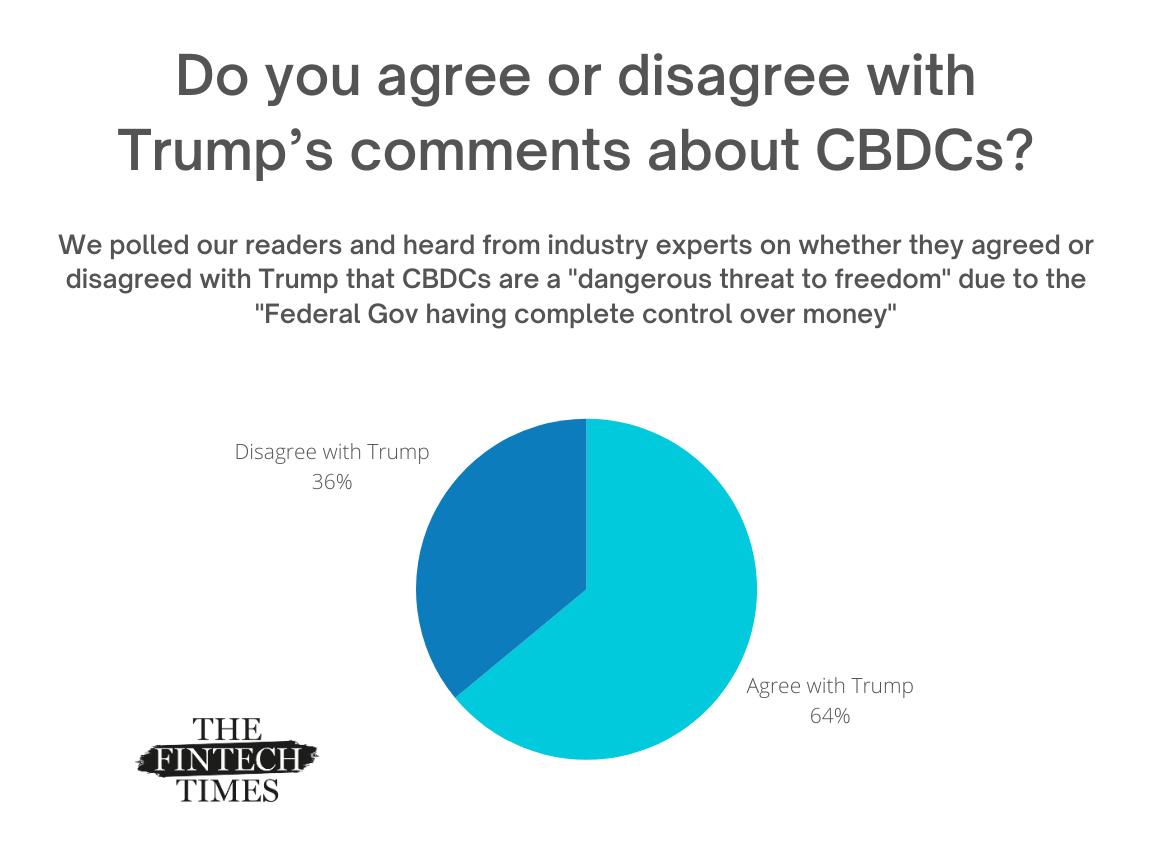Looking to run for President once again, Donald Trump has made his views on central bank digital currencies (CBDCs) very clear: he will not allow their creation. With other countries trialling centralised digital currencies, we wanted to find out how impactful it would be on the US as an innovation hub to halt the development of a digital dollar should Trump be re-elected into the White House.
While not currently a major point for debate in the lead-up to the US Presidential election, Trump first made his views on a CBDC clear at a rally in Portsmouth, New Hampshire on 18 January 2024 during the Republican presidential primary campaign. Declaring it a “dangerous threat to freedom” he said he would “protect America from government tyranny” by never allowing its creation.
JUST IN: ?? Donald Trump says “As your president, I will never allow the creation of a Central Bank Digital Currency. Such a currency would give our federal government absolute control over your money.” pic.twitter.com/lSE2AGYgOm
— Bitcoin Magazine (@BitcoinMagazine) January 18, 2024
Trump reinforced his views at a rally in Laconia, New Hampshire on 22 January 2024. Giving credit to Vivek Ramaswamy, a candidate who stopped his campaign but was a vocal critic of CBDCs, Trump said: “I will never allow the creation of a central bank digital currency.”
Is this a popular move?
Ron DeSantis, Governor of Florida, had also been running his campaign against the former President, however, ahead of the New Hampshire primary, he suspended his campaign and endorsed Trump saying: “I signed a pledge to support the Republican nominee and I will honour that pledge.”
On 24 January 2024, the results of the primary came back with Trump winning 54.2 per cent of the vote share against his final competitor Nikki Haley.
Whether you agree with Trump’s policies on the whole or not, his views on CBDCs have perked the ears of those in the fintech sphere. We polled our readers and heard from industry experts on whether they agreed or disagreed with his comments. Over half (64 per cent) agreed with the former President.

Impact on the US as a crypto hub
CBDCs can be viewed as a gateway for a country to accept cryptocurrency as they are a way for a government to understand and grasp the potential of blockchain and tokenisation.

As a result, stopping the development of a digital dollar could be very impactful on the outlook of crypto in the country too. Nick Maynard, VP of fintech market research at Juniper Research, the market research firm said: “This [ban of CBDCs] would restrict the usefulness of the US as a global crypto hub, and would signal the potential for further regulatory interventions to stifle innovation, which may cause investors and start-ups to choose other destinations for their activities.
“It would signal the potential for further regulatory intervention in other crypto endeavours, which would likely cause vendors to seek more stable regulatory outlooks in other markets.”
Keeping pace with other countries

Offering some similar views, Nils Behling, COO of Tradeteq, the private debt investment marketplace, said: “By the end of 2023, over 130 central banks, representing 98 per cent of global GDP, had initiated programs to explore or develop CBDCs. If the US would halt the development of its CBDC, it could potentially lose its competitive edge in the global crypto market.”
Research from the International Monetary Fund (IMF) found that three countries (the Bahamas, Jamaica and Nigeria) have already introduced CBDCs. Additionally, over 100 other countries including powerhouses like Brazil, China, India and the UK are trailing them.
However, on the other hand, Behlind also added: “That said, one could also argue that the opposite may be true: Any CBDC endorsed by the US government would almost certainly be in competition with existing digital currencies. These stablecoins, issued by private entities but pegged to the USD, would almost certainly become less relevant if the US government would endorse its own version of a stablecoin. This, again, could have potential knock-on effects in the wider crypto ecosystem.”
Staying strong and ahead

Pointing out the strengths of the US financial system, Cuautemoc Weber, CEO and co-founder of Gateway.fm, the decentralised blockchain infrastructure node provider, said: “Traditional financial systems continue to dominate in the US, so halting crypto development won’t cause a blackout to the financial sphere. However, it would dramatically hamper America’s competitiveness in the burgeoning Web3 arena.
“Moving forward, it is crucial for the US to strike a balance between innovation and regulation to harness the full potential of the crypto sector without compromising security and stability. This is best achieved through consultation with industry stakeholders who are committed to helping the space grow with the principles of transparency and security at its core.”
Concerns can be dealt with

Dissecting Trump’s comments about a “danger to freedom”, financial information platform Finimize’s global markets analyst, Reda Farran looks at how issues regarding privacy and freedom surrounding the development of a CDBC can be effectively addressed. He said the two main ways of handling concerns involved ensuring prioritisation on privacy and that the digital dollar must complement physical banknotes, rather than completely replacing them.
He added: “Like any emerging technology, it’s essential to carefully consider the advantages and disadvantages. Can CBDCs pose risks to privacy and freedom? Absolutely. But if these concerns are effectively addressed, then they hold the potential to be used as a beneficial force.
“There are, after all, plenty of benefits to CBDCs: they can’t be counterfeited, they make it easier for governments to spot criminal activity, and since they have the same value as their paper versions, they’ll be a lot less volatile than cryptocurrencies. They also allow for instant and cheap money transfers (including cross-border payments) that could boost economic activity, as well as give unbanked adults access to money transfer services.
“Finally, governments would be able to use CBDCs to quickly implement economy-boosting measures. If, for example, they needed to transfer money to the population like lots of them did during the pandemic, it would be a lot faster and easier if it could be deposited directly into people’s digital wallets. That could bode well for Trump, who has never been known for fiscal austerity.”
A positive regulatory environment

Tayler McCracken, editor-in-chief at Coin Bureau, the crypto gateway platform, agreed with Trump’s views. He noted that a move away from CBDCs would not impact the US as a global crypto hub.
“If the US halts CBDC development, it’s unlikely to affect its role as a global crypto hub. The real issue is the current regulatory environment, which is more inhibitive to crypto innovation than the development of CBDCs. The US can maintain its financial leadership by fostering a positive regulatory framework for cryptocurrencies, independent of CBDCs.
“In summary, the US can continue to thrive in the digital economy by supporting innovative crypto businesses and maintaining financial freedom, without necessarily endorsing CBDCs. This approach aligns with the core principles of decentralised cryptocurrencies.”
A rushed implementation could be catastrophic

As was clear by the poll, many in the industry did not feel Trump was out of place in his comments. One of the respondents, Michael Jackson, former COO for Skype and advisor at Concordium, a layer-1 blockchain, said: “Mr Trump’s concerns about online privacy and security, especially surrounding the potential implementation of central bank digital currencies are valid.
“CBDCs could offer benefits, but a simple and hasty implementation brings huge risks, not least the very real chance of increased data exposure and government surveillance.
“Achieving a delicate balance between privacy, security, and government oversight requires careful consideration and skilled work in a mature environment. Today we see the opposite. A partisan-driven trend to discard academia and encourage the big state.



The Most Read
Сryptocurrencies
Bitcoin and Altcoins Trading Near Make-or-Break Levels
Financial crimes
Thieves targeted crypto execs and threatened their families in wide-ranging scheme
Financial crimes
Visa Warning: Hackers Ramp Up Card Stealing Attacks At Gas Stations
News
Capitalism is having an identity crisis – but it is still the best system
Uncategorized
The 73-year-old Vietnamese refugee is responsible for bringing Sriracha to American consumers
Uncategorized
Electric Truckmaker Rivian, Backed By Amazon, Ford, Raises Whopping $1.3 Billion